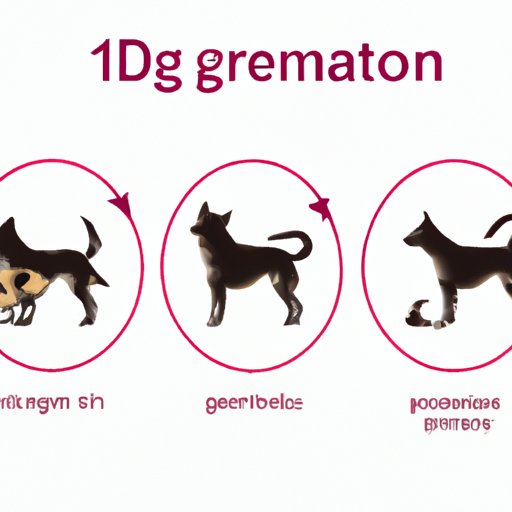
I. Introduction
As pet owners, it’s essential to understand our furry companions’ reproductive cycle to ensure their overall health and wellbeing. This article is specifically tailored to dog owners curious about how to determine if their dog is pregnant. In this guide, we’ll cover the signs and symptoms of pregnancy, necessary steps to detect pregnancy, and important information to monitor your pregnant dog’s health and the birthing process.
II. Understanding the Canine Reproductive Cycle
A female dog’s reproductive cycle comprises four stages: proestrus, estrus, diestrus, and anestrus.
Proestrus is the stage where the dog’s body prepares for mating by releasing hormones that show physical changes such as swelling vagina and bloody discharge. Estrus is when the dog is physically ready to mate, and the discharge turns into pale color from bloody. Diestrus is where the dog can get pregnant, however, not interested in mating, in other ways, is unavailable to male dogs. Finally, the anestrus cycle, where the dog’s body comes to rest and is not physically ready for mating.
Understanding your dog’s reproductive cycle is essential to determine whether she can become pregnant and identify specific pregnancy signs accurately.

III. The Signs and Stages of Dog Pregnancy
A dog’s pregnancy comprises three stages: conception, gestation, and parturition. At conception, the sperm fertilizes the female dog’s eggs in the Fallopian tubes, and the embryos move to the uterus for gestation.
During the gestation period, important changes take place to the female dog’s body. The most notable changes are a visible enlargement of mammary glands, weight gain, and a decrease in appetite. In late pregnancy, puppies can be seen visually through palpation or an ultrasound.
In the final stage, parturition, the female dog will experience contractions and deliver her puppies. It’s important to prepare for this stage and ensure your furry friend has a safe, warm, and comfortable place to give birth.
IV. 7 Symptoms to Look Out for in a Pregnant Dog: A Complete Guide
There are several symptoms you can watch out for to determine if your dog is pregnant.
1. Lack of appetite & vomiting
2. Sudden decrease in activity level or lethargy
3. Sudden nipple growth and darkening
4. Behavioral changes or mood swings
5. Swelling of the abdomen
6. Nesting behaviors such as opening a space and getting things ready for puppies
7. Abnormal vaginal discharge
If you notice any of these symptoms, it’s crucial to consult a professional veterinarian to confirm your dog’s pregnancy and monitor her health.
V. Detecting Pregnancy in Your Furry Friend
Several methods can be used to determine pregnancy, including physical examination, x-rays, ultrasounds, or urine tests. While physical examinations can only confirm pregnancy during the latter stages, ultrasound or X-ray can show if puppies have developed, estimated due date, and a rough count of puppies.
Consulting a veterinarian specializing in animal reproduction is essential to ensure proper diagnosis, monitor your dog’s health during pregnancy, and determine the most suitable delivery process.
VI. Assessing if Your Dog is Expecting: A Basic Guide
One of the most common methods used to determine pregnancy is Home pregnancy tests available in the market for dogs. This test checks for pregnancy hormones present in the dog’s urine. Positive test along with other pregnancy signs indicates that your dog is pregnant. However, it is always essential to verify with a vet before making any assumptions.
One common mistake is taking the test too early, therefore leading to false information or not letting the pregnancy progress enough before confirming.
VII. When Nature Takes Its Course: How to Know if Your Dog is Pregnant
If it was a natural breeding method, it’s hard to identify if your dog is pregnant by spotting symptoms or through home pregnancy tests. A vet would take ultrasounds or X-rays and see if the puppy had developed.
Complications could also arise in natural breeding, such as infections, miscarriages, or delivery complications, so it would help to monitor their overall health during and after pregnancy.
VIII. Conclusion
In conclusion, determining if your dog is pregnant is a crucial step in ensuring proper care and attention during pregnancy, and a safe delivery process for both mother and puppies. Getting advice from a licensed professional and taking the necessary steps to verify pregnancy can help make the process smooth and hassle-free. Always monitor your dog’s health and well-being during and after pregnancy, and consult a veterinarian if you have any concerns.





